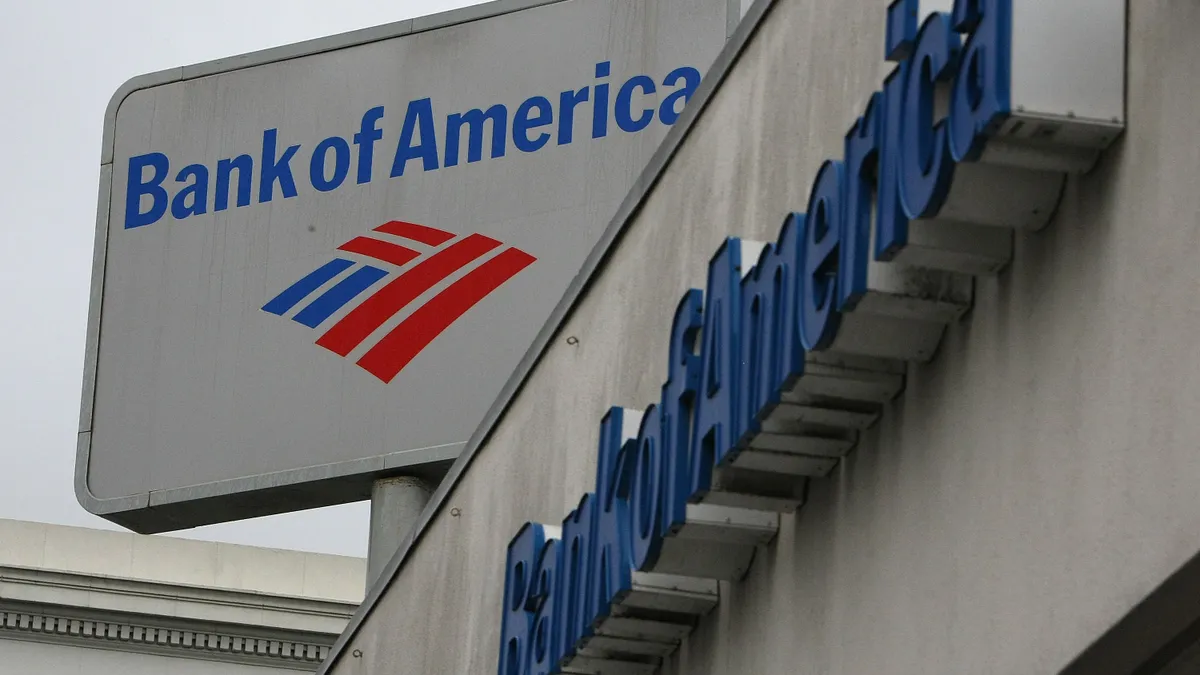UPDATE: May 19, 2021: TD Bank has agreed to pay $41.5 million to settle a class-action lawsuit alleging it charged overdraft fees to customers for each attempt merchants made to process the same transaction, Reuters reported Tuesday.
Bank of America last week agreed to pay $75 million to settle a case in which some account holders claimed the bank similarly charged overdraft fees for each “retry” of a transaction.
TD will pay out half of its settlement — $20.75 million — in cash within 14 days of preliminary approval, Reuters reported. The other half will comprise forgiveness of uncollected fees, and will be automatic 90 days after the settlement’s effective date, according to the wire service.
The TD lawsuit originated in November 2018.
Dive Brief:
- Bank of America agreed to pay $75 million to settle a lawsuit that alleges it collected multiple overdraft fees on individual transactions from checking- and savings-account customers, Reuters reported Friday.
- One plaintiff in the class-action suit said the bank charged her $105 after rejecting her $20 credit-card payment when it retried processing the transaction — without her knowledge — five and nine days after the initial rejection, resulting in three $35 fees, according to the wire service.
- The nation’s second-largest bank will stop charging multiple fees for "retry" payments for at least five years under the settlement, plaintiffs’ lawyers told Reuters.
Dive Insight:
U.S. banks with more than $1 billion in assets took in a combined $11.68 billion in overdraft fees in 2019, the Center for Responsible Lending (CRL) found in June 2020.
Bank of America’s five-year moratorium of retry fees is expected to cost the bank — and save customers — $318 million overall, or $5.3 million a month, plaintiffs’ lawyers said.
The court paperwork, filed Wednesday in the U.S. District Court for the Western District of North Carolina, awaits a judge’s approval. Bank of America neither admitted nor denied wrongdoing in the settlement.
Several big banks have or are planning to roll out accounts that limit overdraft fees. Bank of America and Citi have had no-overdraft accounts since 2014. Wells Fargo announced in 2020 it would launch a check-less no-overdraft-fee account, as well as an account that includes checks and limits overdraft fees to once a month, set for early this year.
Fifth Third Bank's Express Banking account, which launched in 2016, and JPMorgan Chase's Chase Secure, which rolled out in 2019, are among no-overdraft account options aimed at lower-income consumers. About 9% of account holders paid 84% of the overdraft fees, including a disproportionate number of Black and Latino customers, the CRL found.
Challenger banks have embraced no-overdraft offerings, too. Chime's SpotMe feature covers customers who overdraw as much as $100 past the amount in their account, while Varo covers transactions up to $50 over a user's account balance.
The plaintiffs' lawyers in the Bank of America case have said they intend to seek up to $25 million from the settlement fund in attorneys’ fees.













